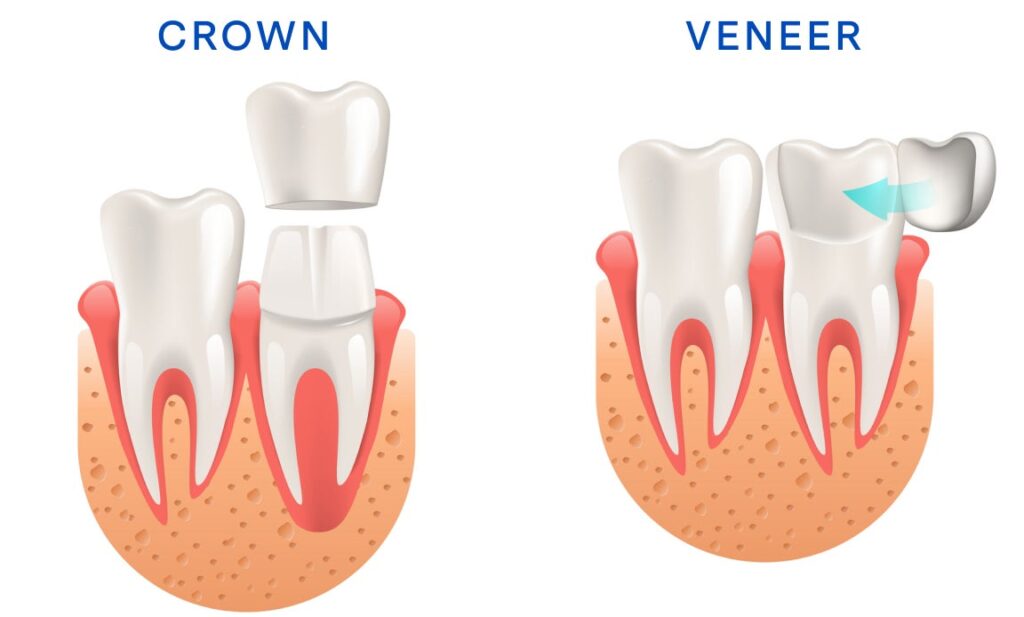
When it comes to achieving a stunning smile, the choice between veneers and crowns can be overwhelming. Understanding the nuances of each cosmetic dental procedure can help you make an informed decision that aligns with your aesthetic goals. This article will delve into the specifics of veneers and crowns, their differences, insurance coverage, and the importance of consulting a cosmetic dentist.
Cosmetic Dental Veneers
Cosmetic dental veneers are thin shells made of porcelain or composite resin that are custom-designed to cover the front surface of your teeth. They are ideal for correcting imperfections such as discoloration, chips, or gaps. The process typically involves minimal tooth preparation, as a small amount of enamel is removed to ensure a perfect fit. With proper care, veneers can last for many years, providing you with a natural-looking and aesthetically pleasing smile.
One of the significant advantages of veneers is their ability to dramatically enhance your smile without invasive procedures. They can be color-matched to your existing teeth, offering a seamless blend that enhances your overall appearance. Additionally, veneers are stain-resistant, allowing you to enjoy vibrant and beautiful teeth for an extended period. However, it’s crucial to maintain good oral hygiene habits to preserve their longevity and appearance.
Cosmetic Dental Crowns
Cosmetic dental crowns, often referred to as caps, are designed to cover the entire tooth, providing strength and support, especially for teeth that are severely damaged or decayed. Crowns can be made from various materials, including porcelain, metal, or a combination of both, and are an excellent option for restoring functionality while enhancing the aesthetics of your smile. The placement of a crown usually requires more tooth reduction compared to veneers, ensuring that it fits securely over the existing tooth structure.
One of the primary benefits of crowns is their durability and strength, making them suitable for back teeth that endure significant chewing forces. They can effectively restore the shape and function of a damaged tooth while blending seamlessly with your natural teeth. Furthermore, crowns can help prevent further damage to a tooth by providing a protective barrier. Like veneers, crowns also require good oral hygiene to maintain their appearance and functionality over time.
Differences Between Dental Veneers and Dental Crowns
The key differences between dental veneers and crowns lie in their design and the extent of tooth coverage they provide. Veneers are primarily cosmetic and only cover the front surface of your teeth, making them an excellent choice for minor imperfections. In contrast, crowns encase the entire tooth, offering restorative benefits in addition to cosmetic enhancements. This distinction makes crowns suitable for more extensive damage or decay, while veneers are ideal for individuals seeking a more subtle transformation.
Another notable difference is the amount of tooth structure that needs to be removed for each procedure. Veneers require minimal alteration of the tooth’s surface, whereas crowns necessitate more significant shaping to ensure a proper fit. Additionally, the lifespan of crowns may vary depending on the material used, but they generally last longer than veneers. Understanding these differences can significantly influence your decision when considering cosmetic options for your smile.
Are Veneers and Crowns Covered by Insurance?
Insurance coverage for veneers and crowns can vary widely based on your insurance provider and plan. Typically, dental crowns may be covered if they are deemed medically necessary, such as in cases where a tooth is severely damaged or decayed. On the other hand, veneers are often viewed as a cosmetic enhancement, and most insurance plans do not provide coverage for them. It’s essential to check with your insurance provider to understand the specifics of your coverage and any potential out-of-pocket expenses you may incur.
In some instances, dental insurance plans may offer partial coverage for crowns, especially if they are part of a larger treatment plan that addresses underlying dental issues. However, since veneers are usually considered an elective procedure, it’s wise to consult with your dentist regarding payment options, financing plans, and any promotions that may be available to help manage costs. Being informed about your insurance coverage can help you plan for the financial aspects of your cosmetic dental procedure.
Schedule a Consultation with a Cosmetic Dentist
Scheduling a consultation with a cosmetic dentist is a crucial step in determining whether veneers or crowns are the right choice for you. During this appointment, you can discuss your specific concerns, goals, and expectations for your smile. A cosmetic dentist will evaluate your oral health, assess the condition of your teeth, and recommend the most suitable procedure based on your needs. This personalized approach ensures you receive the best possible care tailored to your unique situation.
Moreover, a consultation provides an opportunity to ask questions regarding the procedures, including the expected outcomes, recovery times, and maintenance requirements. Additionally, your cosmetic dentist can show you before-and-after photos of previous patients, giving you a clearer idea of the potential results. Investing time in a consultation can help you make an informed decision that not only enhances your smile but also boosts your confidence and overall well-being. Contact 32ology Dental Studio by phone at 818.776.1236 or use our online contact form.
Dr. Argina Kudaverdian – Los Angeles, CA.
32ology Dental Studio – General & Cosmetic Dentistry
18740 Ventura Blvd., Ste 108 Tarzana CA 91356
(818) 776-1236
Serving : Tarzana | Sherman Oaks | Encino | Woodland Hills | West Hills | Reseda